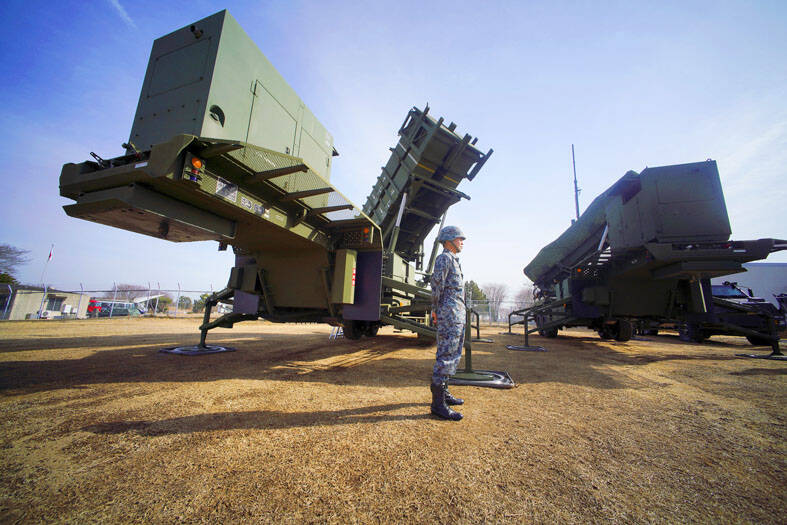The Japanese Cabinet on Friday approved a hefty 16 percent increase in military spending next year and eased its postwar ban on lethal weapons exports, underscoring a shift away from the country’s self-defense-only principle.
The moves came as Japan accelerates the deployment of long-range cruise missiles that can hit targets in China or North Korea, while Japanese troops increasingly work with allies and take on more offensive roles.
In the latest step under a new security strategy that Japan adopted a year ago, Japanese Prime Minister Fumio Kishida’s government also allowed the export of weapons and components made in Japan under foreign licenses to the licensing nations. The move is the first major revision of Japan’s arms export ban since an earlier easing in 2014.

Photo: AP
The ¥7.95 trillion (US$55.8 billion) defense budget for the 2024 fiscal year that begins in March marks the second year of the five-year military buildup program.
The national budget still needs to be approved by the parliament.
“In taking the action, we hope to contribute to defend a free and open international order based on the rule of law, and to achieve the peace and stability in the Indo-Pacific region,” Kishida told reporters. “There is no change to our principle as a pacifist nation.”
The government quickly approved the first export shipment under the change, agreeing to send to the US surface-to-air Patriot guided missiles produced in Japan under a US license.
Officials said it would complement US stock, raising speculation that Japanese-produced Patriot missiles might be sent to Ukraine.
The easing also paves the way for possible exports to the US, the UK and six European licensing nations involving dozens of lethal weapons and components, including F-15s and fighter jet engines.
“The scope, scale, and speed of Japan’s security reforms have been unprecedented,” US Ambassador to Japan Rahm Emanuel wrote on X.
He praised the easing of the defense equipment and transfer policy as historic and “a significant example of Japan’s shared commitment to deterrence.”
The ban on the export of lethal weapons has limited the scope of Japan’s efforts to develop arms technology and equipment.
The easing would help strengthen Japan’s feeble defense industry and broaden the country’s new official military aid designed for like-minded nations in the Indo-Pacific region in countering Chinese assertiveness, experts say.
Japan is next year spending more than ¥70 billion on developing a next-generation fighter jet with the UK and Italy, and the project hinges on a further easing of restrictions to allow the export of jointly developed lethal weapons to third countries — a change Kishida wants by the end of February.
The centerpiece of Japan’s military budget for next year is an early deployment of “standoff” missiles that officials say are needed to reinforce air defenses, especially to protect Japan’s southwestern islands in case a conflict erupts between China and Taiwan.

The Ministry of the Interior (MOI) is to tighten rules for candidates running for public office, requiring them to declare that they do not hold a Chinese household registration or passport, and that they possess no other foreign citizenship. The requirement was set out in a draft amendment to the Enforcement Rules of the Public Officials Election and Recall Act (公職人員選舉罷免法 ) released by the ministry on Thursday. Under the proposal, candidates would need to make the declaration when submitting their registration forms, which would be published in the official election bulletin. The move follows the removal of several elected officials who were

The Republic of China (ROC) is celebrating its 114th Double Ten National Day today, featuring military parades and a variety of performances and speeches in front of the Presidential Office in Taipei. The Taiwan Taiko Association opened the celebrations with a 100-drummer performance, including young percussionists. As per tradition, an air force Mirage 2000 fighter jet flew over the Presidential Office as a part of the performance. The Honor Guards of the ROC and its marching band also heralded in a military parade. Students from Taichung's Shin Min High School then followed with a colorful performance using floral imagery to represent Taiwan's alternate name

FOUR DESIGNATED AREAS: Notices were issued for live-fire exercises in waters south and northwest of Penghu, northeast of Keelung and west of Kaohsiung, they said The military is planning three major annual exercises across the army, navy and air force this month, with the navy’s “Hai Chiang” (海強, “Sea Strong”) drills running from today through Thursday, the Ministry of National Defense said yesterday. The Hai Chiang exercise, which is to take place in waters surrounding Taiwan, would feature P-3C Orion maritime patrol aircraft and S-70C anti-submarine helicopters, the ministry said, adding that the drills aim to bolster the nation’s offshore defensive capabilities. China has intensified military and psychological pressure against Taiwan, repeatedly sending warplanes and vessels into areas near the nation’s air defense identification zone and across

A Chinese takeover of Taiwan would severely threaten the national security of the US, Japan, the Philippines and other nations, while global economic losses could reach US$10 trillion, National Security Council Deputy Secretary-General Lin Fei-fan (林飛帆) wrote in an article published yesterday in Foreign Affairs. “The future of Taiwan is not merely a regional concern; it is a test of whether the international order can withstand the pressure of authoritarian expansionism,” Lin wrote in the article titled “Taiwan’s Plan for Peace Through Strength — How Investments in Resilience Can Deter Beijing.” Chinese President Xi Jinping’s (習近平) intent to take Taiwan by force